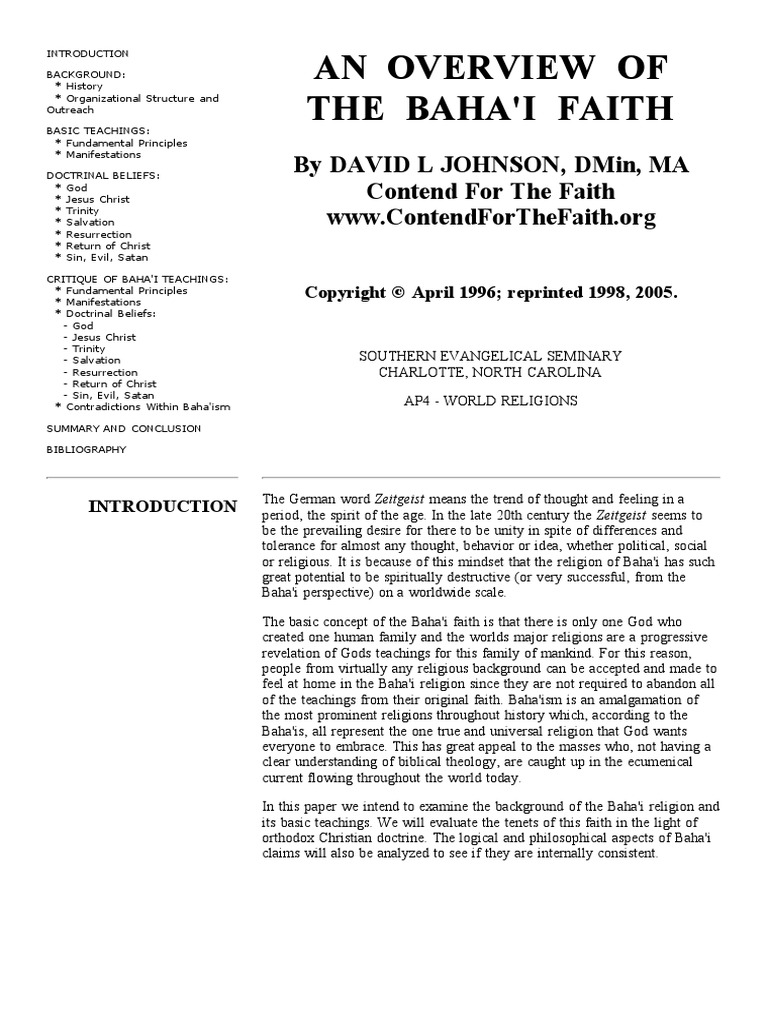The exploration of Baha’i teachings presents an extraordinary opportunity to delve into a spiritual paradigm that aims to promote universal peace, unity, and the advancement of humanity. To evaluate Baha’u’llah’s New Faith effectively, one must navigate through a plethora of theological concepts, historical contexts, and practical implications that coalesce into an intricate tapestry of beliefs and practices. Below, we delineate a comprehensive framework to assist in this exploration, inviting an intellectual curiosity to apprehend the profundity enveloping the teachings of Baha’u’llah.
1. Understanding the Historical Context
To embark on an astute evaluation of Baha’u’llah’s teachings, one must first grasp the socio-political milieu in which he emerged. The onset of the 19th century marked a period of tremendous upheaval in Persia, characterized by religious unrest and a burgeoning desire for reform. The Babi movement, which preceded the Baha’i Faith, played a pivotal role in catalyzing Baha’u’llah’s prophetic journey. Thus, it becomes imperative to analyze the circumstances that precipitated the rise of Baha’u’llah as a religious leader.
Furthermore, by contextualizing Baha’u’llah’s revelations within the broader historical narrative of prophetic traditions, one cultivates a deeper understanding of his objectives. The evaluation of Baha’u’llah’s contributions also necessitates an examination of the political repression he faced, for it underscores the fundamental essence of resilience and persistence inherent in the Baha’i Faith.
2. Investigating the Core Teachings
The crux of Baha’u’llah’s message revolves around the unity of humanity, the oneness of God, and the essential harmony between science and religion. Several key tenets merit close scrutiny:
- Oneness of Humanity: Baha’u’llah posits that all humans are integral to a singular race. This revolutionary concept transcends ethnic, national, and religious boundaries, prompting adherents to foster global solidarity.
- Independent Investigation of Truth: Baha’u’llah encourages individuals to engage in personal inquiry rather than tradition-based acceptance. This principle not only cultivates critical thinking but also invites seekers to establish an authentic connection with the divine.
- Universal Education: The emphasis placed on education as a catalyst for personal and collective advancement is profound. Baha’u’llah heralds universal education as a means for societal transformation, advocating for the elimination of prejudice and the empowerment of individuals through knowledge.
- Harmony between Science and Religion: Baha’u’llah articulates the necessity of reconciling scientific inquiry with spiritual insights, recognizing that both realms serve to elevate human understanding.
A discerning evaluation must consider how these tenets resonate within contemporary societal paradigms, inviting opportunities for dialogue and reflection.
3. The Concept of Manifestations of God
Central to the Baha’i Faith is the belief in the Manifestations of God—divine figures who appear throughout history to guide humanity. Baha’u’llah is viewed as the latest of these Manifestations. Evaluating Baha’u’llah’s role necessitates a comparative analysis with other religious figures, assessing the continuity of divine guidance and the evolution of spiritual teachings across different epochs.
This comparative approach incites intellectual curiosity, as one begins to scrutinize the underlying threads that unify disparate religious traditions. The implications of such a perspective are not merely academic; they can instigate transformative dialogues among diverse faith communities, fostering mutual respect and understanding.
4. The Role of Baha’i Institutions
In the evaluation of Baha’u’llah’s teachings, it is crucial to investigate the administrative and social structures established within the Baha’i community. The system of elected bodies, such as Local and National Spiritual Assemblies, exemplifies a novel approach to governance rooted in consultation and collective decision-making.
Through a careful analysis of these institutions, one gleans insights into their efficacy in promoting unity and collaboration among members. Are these structures enabling a true representation of diverse voices? How do they facilitate the implementation of Baha’u’llah’s principles in a complex, modern world? These inquiries encourage deeper reflection on the operational dynamics within the Baha’i community.
5. Personal Application of Teachings
Perhaps the most compelling facet of evaluating Baha’u’llah’s Faith is its applicability to individual lives. The teachings advocate for personal transformation and ethical living, urging followers to embody principles of love, service, and justice in daily existence.
To appreciate the practical implications of Baha’i teachings, one might assess the impact of such ideals on interpersonal relationships, community service, and personal accountability. The transformative potential inherent in recognizing oneself as a global citizen, committed to the betterment of humanity, invokes a profound sense of purpose.
6. Challenges and Critiques
As with any religious framework, Baha’i teachings face scrutiny and opposition. Evaluating the criticisms lodged against the Faith—whether they relate to misunderstandings of its principles or the complexities of its history—provides a rounded perspective. Establishing a sincere dialogue that addresses these challenges enriches one’s understanding and can lead to greater empathy and comprehension.
In this context, one must also consider the implications of interfaith relationships and dialogue, recognizing that genuine understanding transcends intellectual discourse and calls for active engagement with diverse beliefs.
7. Conclusion
Ultimately, evaluating Baha’u’llah’s New Faith invites an intellectual and spiritual journey, driven by a quest for truth and a yearning for unity. This exploration is not merely an academic exercise but a transformative endeavor that holds the promise of reshaping individual worldviews and fostering global cohesion. By delving into the teachings of Baha’u’llah, one opens the door to profound insights that can transcend personal boundaries and contribute to the collective advancement of humanity.
